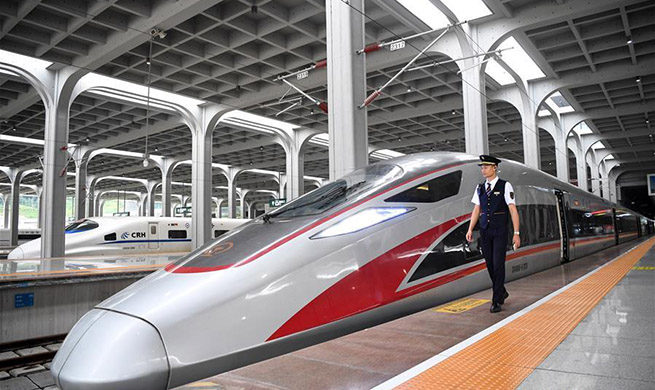BERLIN, Aug. 6 (Xinhua) -- Vehicles with high carbon dioxide (CO2) emissions should be made more expensive in order to protect the climate, the German Environment Agency (UBA) demanded on Tuesday.
"We must find measures to promote climate-friendly mobility," Maria Krautzberger, President of the Federal Environment Agency, told the German Press Agency (dpa).
The UBA was proposing the introduction of a revenue-neutral system for new vehicles in Germany that would work with positive and negative incentives, according to Krautzberger.
An extra premium could be levied on vehicles with high CO2 emissions through a motor vehicle tax that would increase over several years, UBA President Krautzberger noted.
Meanwhile, a bonus would be paid out through targeted support for consumers who bought a new car with low CO2 emissions in Germany.
In July, the German SUV segment recorded strong growth as the number of new SUV registrations increased by 15.6 percent year-on-year to 66,660 vehicles, according to the Federal Motor Transport Authority (KBA).
"One should not be surprised about an SUV boom if the car industry brings one model after the other into the sales rooms," German Green party member Stephan Kuehn told the dpa.
"Car manufacturers who focus their portfolios on such climate killers are torpedoing climate protection," criticized the German Green politician, adding that the government's climate cabinet "must take more responsibility for climate policy on the part of fuel guzzlers".
Deputy chairman of the German liberal FDP parliamentary group Frank Sitta responded critically to the demands from the UBA.
"Instead of helping the government to finally get a targeted CO2 price concept for transport off the ground, the Federal Environment Agency is looking at simulation games that sound more like punitive actions for car owners than effective climate protection policies," criticized Sitta.
The question of how to reduce CO2 emissions in the German transport sector has been under discussion for some time. And on Sept. 20, the government's climate cabinet will decide on an overall package of national climate protection measures.
A CO2 price that would make fuel, heating oil and natural gas more expensive in order to promote CO2 savings in the transport and building sectors was proposed by German Environment Minister Svenja Schulze.
The Bavarian conservative CSU had recently suggested reforming the German motor vehicle tax to be oriented towards CO2 emissions.
The German government had also discussed the possibility of giving company cars with lower CO2 emissions even greater tax advantages.
"A further differentiation of the company car tax according to type of drive and emissions is just as sensible as the restructuring of the motor vehicle tax with a stronger CO2 component," Ulrich Lange, transport policy spokesperson of the conservative union CDU/CSU, told the Rheinische Post.
Automotive industry expert Ferdinand Dudenhoeffer pointed out that pure electric SUVs were increasingly being sold, but at a low level to date and most SUVs were plug-in hybrids.
Germany needed a "real switch" to battery-operated electric cars or zero CO2 cars, emphasized Dudenhoeffer, adding that fuels should be "burdened" with CO2 levies.













